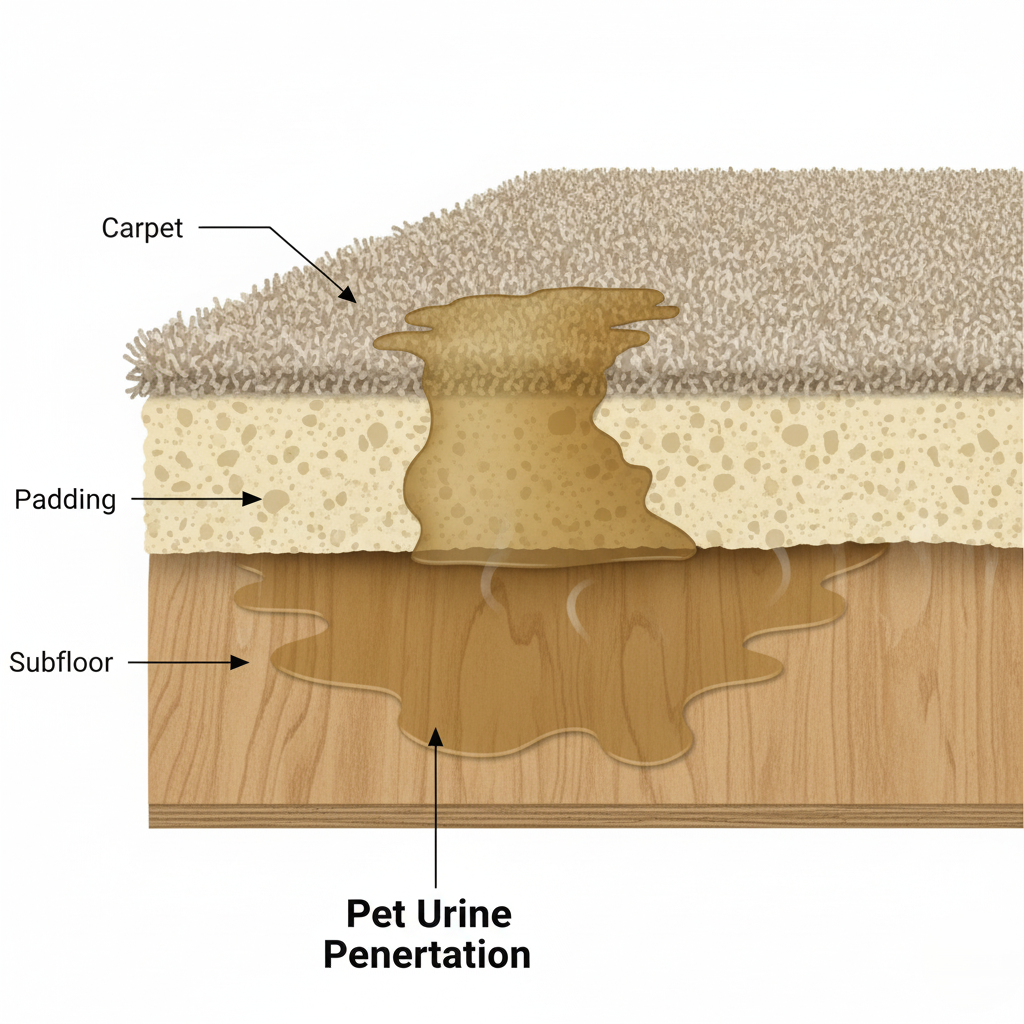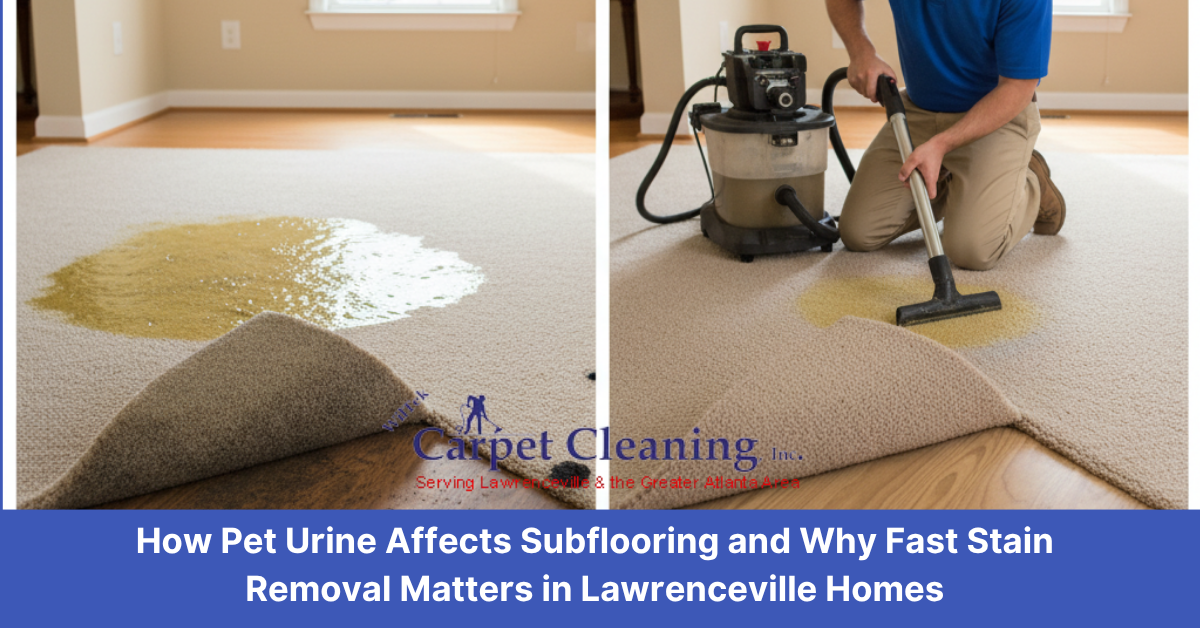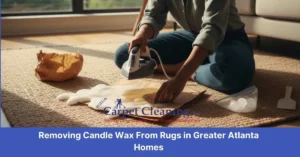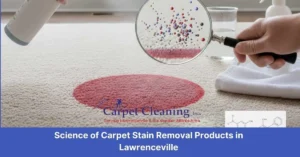Pets are family, and their companionship brings warmth and happiness to every Lawrenceville household. But let’s be honest, accidents happen. Whether it’s a puppy still in training or an older dog struggling with bladder control, pet urine stains are inevitable. What many homeowners don’t realize, however, is that urine doesn’t just affect your carpet’s surface.
When pet urine seeps through carpet fibers and padding, it can reach the subflooring, the foundational layer beneath your flooring material. Over time, this leads to unpleasant odors, bacterial growth, and even structural damage. In Lawrenceville’s humid environment, trapped moisture from pet urine can worsen the issue, promoting mold growth and warping wooden subfloors.
Understanding how pet urine damages your floors and why immediate cleanup is essential can save you from expensive flooring replacements later on.

How Pet Urine Damages Your Flooring Layers
When your pet has an accident, it may seem minor. But beneath the surface, several layers of your flooring are affected in different ways.
1. Carpet Fibers
Pet urine first soaks into the top layer, your carpet fibers. As the liquid evaporates, uric acid crystals remain. These crystals are responsible for that persistent ammonia-like smell that won’t go away even after vacuuming or using air fresheners.
2. Carpet Padding
Below the carpet is the padding, which acts like a sponge. Once urine reaches this layer, it’s much harder to remove. The padding traps moisture, fostering bacterial growth and leading to mildew or mold development—both of which can affect your home’s air quality.
3. Subflooring
Most subfloors in Lawrenceville homes are made of plywood or OSB (Oriented Strand Board). These materials are porous, so once urine seeps in, it can cause staining, swelling, and long-term odor retention. In severe cases, the wood fibers begin to break down, leading to soft spots in the flooring.
Why Quick Stain Removal Is So Important
Time is your biggest ally when dealing with pet urine. The longer it sits, the deeper it penetrates, and the harder it becomes to remove.
1. Preventing Lingering Odors
Urine contains ammonia and bacteria that release strong, unpleasant smells. If not addressed quickly, these odors can spread throughout your home and linger indefinitely. Fast action ensures you neutralize odors before they set in.
2. Protecting Indoor Air Quality
Prolonged exposure to urine odors and bacteria can lead to respiratory irritation or allergic reactions, especially for children and older adults. Quick cleanup helps keep your living space hygienic and breathable.
3. Avoiding Mold and Bacterial Growth
Lawrenceville’s warm and humid climate creates perfect conditions for mold to thrive. Moisture trapped under carpets can promote bacterial colonies and mold spores, both of which can be harmful to your health.
4. Saving Money on Repairs
Replacing subflooring or carpet padding can be costly. By acting fast, you can prevent long-term damage and save hundreds, or even thousands, of dollars in restoration expenses.

Warning Signs Your Subfloor Might Already Be Damaged
Even if you’ve been diligent with cleaning, sometimes damage happens before you realize it. Look for these signs that your subfloor might be compromised:
- Persistent Odor: The most obvious clue. If the smell lingers even after cleaning, urine has likely penetrated deep into the subfloor.
- Dark Spots or Discoloration: Visible stains on the carpet or floorboards suggest moisture damage below.
- Soft or Uneven Flooring: Warped or weakened flooring often indicates subfloor saturation.
- Musty or Damp Smell: A musty odor points to mold growth beneath the carpet.
If any of these symptoms appear, it’s best to have your flooring professionally inspected.
Professional Pet Urine Removal Techniques
Surface cleaning may temporarily reduce the smell, but professional treatments target the root cause, urine crystals embedded deep within flooring layers.
1. Enzymatic Cleaning
Professional cleaners use enzyme-based solutions that break down uric acid crystals and neutralize odors at the molecular level. These cleaners are also eco-friendly and safe for pets.
2. Deep Extraction Cleaning
High-powered machines extract contaminants from the carpet and padding, removing any remaining moisture and bacteria.
3. Subfloor Sealing and Treatment
If urine has soaked into the subfloor, technicians can apply odor-blocking sealants that prevent future odors from resurfacing. In extreme cases, damaged sections may need replacement.
4. Air Purification
Some professionals use HEPA air scrubbers to remove airborne particles and lingering odors, ensuring a completely clean environment.
DIY Cleaning Tips for Pet Urine Stains
While professionals are best for deep cleaning, quick at-home action can minimize damage:
- Blot, Don’t Rub: Use paper towels or a cloth to absorb as much urine as possible. Rubbing spreads the stain and pushes urine deeper.
- Apply Enzyme-Based Cleaner: These cleaners target organic stains like urine and neutralize odor-causing bacteria.
- Use a Wet/Dry Vacuum: This helps extract excess moisture from the carpet and padding.
- Avoid Steam Cleaners: Heat can set the stain permanently and intensify the odor.
- Deodorize Naturally: Sprinkle baking soda after cleaning and let it sit for a few hours before vacuuming.
Preventing Future Accidents and Damage
Pet urine damage is preventable with the right steps:
- Regular Carpet Maintenance: Schedule professional carpet cleaning every 6–12 months to prevent buildup.
- Training and Behavior Correction: Address the cause of accidents, whether it’s anxiety, old age, or medical issues.
- Use Protective Mats or Rugs: Place waterproof mats in high-traffic or accident-prone areas.
- Prompt Cleanup: The faster you act, the less chance for long-term damage.
Protecting Your Lawrenceville Home Long-Term
Your home’s subfloor might be out of sight, but it shouldn’t be out of mind. Pet urine can silently deteriorate your flooring from beneath, causing expensive damage if ignored. The good news? Acting quickly and relying on professional cleaning services can save you time, money, and stress.
By choosing regular inspections and deep cleaning services, homeowners in Lawrenceville and surrounding areas can maintain a clean, safe, and odor-free living environment for both family and pets. Professional cleaners have specialized equipment to detect hidden moisture and remove deep-seated odors that DIY methods simply can’t reach.
Call to Action
Don’t wait until the damage is permanent!
Protect your floors and your home’s air quality with professional pet urine and odor removal services in Lawrenceville. Contact your trusted local cleaning experts today to schedule a detailed inspection and keep your home fresh, clean, and comfortable for everyone, pets included.







